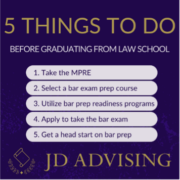Default Rules on the Multistate Bar Exam
Default Rules on the Multistate Bar Exam
The National Conference of Bar Examiners (NCBE) administers the Multistate Bar Exam (MBE). Many applicants might refer to the MBE as the “multiple-choice” section of the bar exam. The vast majority of jurisdictions, including UBE jurisdictions, include the MBE as a component of the bar exam. The MBE contains several default rules that you need to be aware of when taking the exam. The NCBE states these rules in their MBE Subject Matter Outline, so you are required to know them and apply them on the MBE. We have compiled all the MBE default rules by subject from the NCBE in this post to make it easy for you to refer to as you prepare for the MBE!
Default Rules on the Multistate Bar Exam
Note that these rules do not apply if the fact pattern provides a statute or states that another rule applies. For example, pure comparative fault is the default rule on the MBE. However, if the facts state that the jurisdiction is a contributory negligence jurisdiction, you should not apply pure comparative fault and should apply contributory negligence instead! Be sure to carefully read the fact pattern so you know which rule to apply!
Civil Procedure
From the NCBE:
Examinees are to assume the application of (1) the Federal Rules of Civil Procedure as currently in effect and (2) the sections of Title 28 of the U.S. Code pertaining to trial and appellate jurisdiction, venue, and transfer. Approximately two-thirds of the Civil Procedure questions on the MBE will be based on categories I, III, and V, and approximately one-third will be based on the remaining categories—II, IV, VI, and VII.
How this applies on the MBE:
- The Federal Rules of Civil Procedure that may appear on the MBE include (but are not limited to) rules such as Rule 4 (service of process, personal jurisdiction), Rule 11 (sanctions) Rule 12(b)6 (failure to state a claim upon which relief can be granted), Rule 18(a) (joinder of claims), Rule 23 (class actions), and Rule 56 (summary judgment).
- The sections of Title 28 of the U.S. Code that apply on the MBE deal with the jurisdiction of trial and appellate courts (subject-matter jurisdiction—federal question, diversity jurisdiction, supplemental jurisdiction, what decisions are appealable) and venue determination and transfer (proper forum, more appropriate forum).
Constitutional Law
From the NCBE:
The terms “Constitution,” “constitutional,” and “unconstitutional” refer to the federal Constitution unless indicated otherwise.
How this applies on the MBE:
Terms referring to a constitution on the MBE refer to the United States Constitution unless the facts tell you otherwise.
Contracts and Sales
From the NCBE:
Examinees are to assume that the Official Text of Articles 1 and 2 of the Uniform Commercial Code has been adopted and is in effect.
How this applies on the MBE:
- Article 1 of the UCC contains definitions and general provisions that apply to all articles of the UCC.
- Article 2 of the UCC deals with the sale of goods. Bar Exam Tip: Remember that the UCC does not apply to contracts for services or contracts that are otherwise not for the sale of goods. Common law applies to those contracts!
Criminal Law and Procedure
No default rules apply on the MBE.
Evidence
From the NCBE:
All Evidence questions should be answered according to the Federal Rules of Evidence, as currently in effect.
How this applies on the MBE:
The Federal Rules of Evidence that may appear on the UBE include (but are not limited to) rules such as Rule 401 (relevance), Rule 403 (balancing test of probative value and unfair prejudice), Rule 404 (character evidence), and Rule 802 (rule against hearsay).
Real Property
No default rules apply on the MBE.
Torts
From the NCBE:
Examinees are to assume that survival actions and claims for wrongful death are available. Joint and several liability and pure comparative fault are the relevant rules unless otherwise indicated.
How this applies on the MBE:
- Joint and several liability allows a plaintiff to recover all their damages against a single defendant, regardless of that defendant’s percentage of fault.
- Pure comparative fault is an affirmative defense to negligence that allows a plaintiff to recover against a defendant, no matter how high the plaintiff’s percentage of fault is.
Looking to Pass the Bar Exam?
Free Resources:
- 🌟Bar Exam Free Resource Center: Access our most popular free guides, webinars, and resources to set you on the path to success.
- Free Bar Exam Guides: Expert advice on the MBE, the MEE, passing strategies, and overcoming failure.
- Free Webinars: Get insight from top bar exam experts to ace your preparation.
Paid Resources:
- 🏆One-Sheets: Our most popular product! Master the Bar Exam with these five-star rated essentials.
- Bar Exam Outlines: Our comprehensive and condensed bar exam outlines present key information in an organized, easy-to-digest layout.
- Exclusive Mastery Classes: Dive deep into highly tested areas of the MBE, MEE, MPT, and CA bar exams in these live, one-time events.
- Specialized Private Tutoring: With years of experience under our belt, our experts provide personalized guidance to ensure you excel.
- Bar Exam Courses: On Demand and Premium options tailored to your needs.
- Bar Exam Crash Course + Mini Outlines: A great review of the topics you need to know!
🔥 NEW! Check out our Repeat Taker Bar Exam Course and our new premier Guarantee Pass Program!







Leave a Reply
Want to join the discussion?Feel free to contribute!